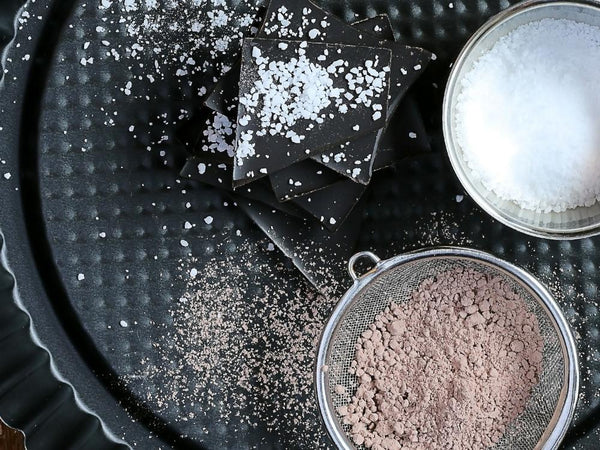Health
3 Benefits of salt water and side effects

Discover the 3 shocking health benefits of salt water and side effects.
Sometimes the best remedies in life are the simplest. This is true of an ancient skincare hack known for tightening pores, balancing oil production, and rejuvenating skin.
You won’t need fancy skin creams packed with chemicals and preservatives to achieve a youthful glow after this.
You can start to improve the quality of your skin with just two things: purified water and high-quality salt, and you will see how the benefits of saltwater will work miracles for you.
Health Benefits of saltwater
Since saltwater therapy has been used for centuries throughout the world, including ancient Greece, there is strong anecdotal evidence that it works wonders on the skin.
A handful of studies have found the saltwater bath to be particularly effective for troublesome skin conditions, such as psoriasis.
Saltwater is said to benefit your skin in the following eleven ways:
• Closes open pores
• Absorbs excess oil
• Balances oil production
• Kills acne-causing bacteria
• Diminish scars
• Heals scratches and cuts
• Exfoliates dead skin cells
• Restores the natural pH of the skin
• Improves the barrier function of the skin
• Improves hydration
• Reduces inflammation
1.- Benefits of salt water for acne
If you are lucky enough to live near the ocean, you may already know this beauty secret.
But if you don’t live on the coast, just fan warm salt water the next time you have an outbreak.
Try mixing a cup of purified water with a tablespoon of sea salt.
Use a cotton ball to gently apply saltwater to acne and allow it to dry.
By the way, if you try this treatment and your acne still isn’t clearing up within a day or two, maybe your diet is to blame.
Make sure to avoid sugar, processed junk, gluten, peanuts, yeast, and dairy for a while to see if your skin clears up.
Eat plenty of green leafy vegetables, lean protein sources, and healthy fats like coconut oil and avocados; your skin and waist will thank you.
2.- Benefits of salt water for scratches
If you’ve ever heard the expression “throwing salt on a wound,” you probably aren’t very interested in putting salt water near your scratches.
However, this treatment can be beneficial in killing harmful bacteria and speeding up the healing process.
Research shows that bathing in magnesium-rich Dead Sea salt improves the skin’s barrier function, improves skin hydration, and reduces skin inflammation, which are all the things you’ll need if you have a cut or scratch.
Fill your bathtub with warm water and pour in a cup of sea salt.
Take the experience to the next level by adding 10 drops of lavender essential oil.
The scent will promote a deep sense of relaxation – you may even feel like you are in a spa!
3.- Drink salt water to heal from the inside out
The good thing about salt water is that there are many ways to use it. A glass of warm salt water, called “Sole,” is a great way to start your day and promote internal healing.
As long as you use a natural form of salt (and avoid drinking seawater), it will promote hydration, facilitate digestion, reduce inflammation, improve your sleep, detoxify your cells, improve your bone health, and more.
What does salt do to the body
We rarely think about what goes into nature’s most common treasures, like salt.
This natural mineral comes directly from the earth, formed into crystals from a combination of sodium and chloride.
It is found naturally in seawater, making up at least three percent of our world’s oceans. And when seawater is trapped, the water evaporates and leaves salt crystals.
Despite what you may have heard about sodium and your health, a natural source of salt contains vital nutrients that are important for maintaining optimal well-being.
First, salt provides key minerals like sulfur, calcium, sodium, magnesium, silicon, boron, potassium, bromine, and strontium.
With its rich mineral content, salt can help you lose weight, reduce asthma symptoms, improve blood sugar levels, and regulate heart health.
However, keep in mind that not all salts are created equal. Table salt, for example, is highly processed and bleached before it reaches that little glass bottle.
Unfortunately, during mass production, manufacturers strip you of everything good for your health.
The result is a product that does not resemble its original form and can even harm your health. When doctors warn against consuming too much salt, table salt is what they mean.
For your skincare routine and general health, try using these unprocessed varieties:
Sea salt for skin
Natural sea salt contains the many minerals our bodies need, such as magnesium, calcium, sodium, and potassium.
All of these play a role in the health of our skin, allowing cells to communicate with each other and heal problems that arise.
When you don’t have enough minerals, you will see annoying symptoms like dry skin, dullness, irritation, and blemishes.
Fortunately, sea salt can naturally enhance hydration and strengthen the outer layer of your skin to keep it looking healthy.
Himalayan pink salt for skin
Despite the name, there are no salt mines in the Himalayas. The pink salt slabs come from the Khewra Salt Mine in Pakistan, about 300 miles west of the Himalayas.
As the second-largest salt mine in the world, people have been collecting this commodity for more than 2,000 years.
Only in the last decade has it become popular in Western culture. Salt is made up of 95 percent sodium chloride.
The rest is a mixture of polyhalite and other minerals, which give the salt its characteristic pinkish hue.
Due to the lack of processing, it still contains the beneficial minerals that your skin will love.
As you can see, saltwater provide a series of skincare benefits, so if you want to show off shiny and well-groomed skin, do not hesitate to follow each of the tips in this publication step by step.
Health
Contraindications and side effects of Bupropion

Discover the contraindications and side effects of Bupropion.
This psychotropic drug is used both to treat depressive symptoms and in tobacco addiction.
A drug belonging to the IRND.
Tobacco is one of the substances with psychoactive effects that have been used the most legally since its discovery.
Even though today smoking is prohibited in establishments and closed public spaces and its price has risen based on taxes, millions of people still have the habit of smoking.
But many of these people, at some point, need to stop. Although it is possible to do it voluntarily, in some cases they may require psychological and even pharmacological help.
In the latter case, one of the existing drugs used to quit smoking is bupropion, a drug that originated as an antidepressant.
What is bupropion?
Bupropion is a well-known antidepressant drug, although more than in its application for depression it is more common and distinctive due to its efficacy in the treatment of tobacco addiction.
In this sense, it is a treatment that does not include nicotine and that is recommended together with some type of therapy or psychological treatment.
This shows that psychotropic drugs are not designed following a plan from scratch, but rather that there is a certain process of trial and error in their development, and that sometimes there are benefits for the drug that were not even taken into account at first.
Bupropion is a specific dopamine and norepinephrine reuptake inhibitor, or NRDI , that works by increasing the levels of these neurotransmitters in the brain.
Compared with other drugs in the group of antidepressants, bupropion has the advantage of not causing sexual dysfunctions, although, on the other hand, its effectiveness alone seems less compared to other drugs on the market.
Thus, bupropion is an example that molecules related to other substances used for a certain class of disorder may be more useful in different health conditions, no matter how similar their structure is.
Mechanism of action
The function of bupropion and its mechanism of action is based on its role as a selective inhibitor of dopamine and norepinephrine reuptake.
This implies that bupropion works by preventing these two transmitters (associated with gratification and energy) from being re-uploaded by the presynaptic neuron, in such a way that they are available to postsynaptic neurons for a longer time.
Furthermore, it appears to stimulate the secretion of these neurotransmitters.
Thus, dopamine and norepinephrine levels and their transport increase at the brain level, something that can alter the mood.
Likewise, it has also been observed that it has an effect at the level of acetylcholine, binding to nicotinic receptors and exerting a non-competitive antagonistic effect.
Although there is no total security for this, this element is one of the possible explanations for its role in smoking cessation.
However, it must be taken into account that the exact way in which the mechanism of action of bupropion and psychotropic drugs in general works is still unknown.
Its use does not guarantee that it will work to alleviate the symptoms of the disorder to be treated, and its efficacy is only slightly better than that of a placebo.
That does not mean that in many cases it is very useful, simply that the percentage of patients who try this treatment and do not obtain any benefit is relatively high.
Indications: uses in disorders
Bupropion is a drug that has had various uses throughout its history. Although it was born as an antidepressant and today it is still used to treat this condition both as monotherapy (single therapy) and combined therapy (more common, to enhance some specific antidepressants when first-line drugs are not effective), the truth is is that by itself it is generally considered less effective than other antidepressants.
Where this drug stands out and has the greatest use is in smoking cessation, being effective in reducing the consumption habit and the urge to smoke.
In this sense, its mechanism of action seems to contribute to stopping craving (possibly due, on the one hand, to its antagonism of nicotinic receptors and its interaction with brain dopamine, although the exact mechanism is not fully known).
Another disorder in which it is used is seasonal affective disorder, in which depressive episodes appear associated with certain times of the year.
In addition to the above, it has sometimes been used in the treatment of bipolar disorder, especially during the depressive episodes that can occur in this disorder (although this use requires caution since there is a risk of turning the disorder into a manic crisis).
Also in ADHD. But in any case, further research is required and possible risks must be taken into account.
Side effects of Bupropion
Bupropion is a drug that is very useful in smoking cessation and is used in cases of depression, but as with other drugs, its clinical utility is not free of risks and possible side effects.
This occurs because the active substance in bupropion affects many areas of the body, not just the areas that could produce an improvement in symptoms.
This unwanted interaction generates a chain reaction of consequences to some extent unpredictable, which can lead to new health disorders (although they tend to disappear as the substance leaves the body). Therefore, its use should always be supervised and indicated by doctors.
In this sense, among the main side effects of bupropion, we can find the cause of insomnia (being one of the most frequent), dry mouth and dizziness, headaches, nausea, constipation, rapid heartbeat, tremors, skin rashes, agitation, and nervousness. It can also cause a decrease in appetite.
In more serious cases it can generate seizures (this being one of the most well-known serious risks), arrhythmias, hallucinations, panic or difficulties in breathing or feeding, or inflammations being necessary to see a doctor. In some cases, it can cause irritability, hostility, depression, suicidal thoughts.
Contraindications of Bupropion
In addition to these side effects, this drug is contraindicated in some sections of the population.
People who are allergic to it or any of its components (something obvious on the other hand), those who consume certain medications (especially MAOS), dependence on substances other than tobacco (such as alcohol, drugs, and pharmaceuticals), and those who suffer from epilepsy, brain tumors and anorexia nervosa or bulimia (since it reduces the appetite).
It is also not recommended, although it can sometimes be used if the benefits are considered greater than the risks, in cases of people with kidney or liver failure, head trauma, insomnia, or the use of other medications that may interact with bupropion.
Diabetics, alcoholics, hypertensive or people with psychiatric disorders (since it can contribute to the appearance of mania in bipolar or psychotic crisis in schizophrenia, among others) also have it contraindicated (or at least the treatment should be done with a high level of control of the patient’s condition and the doses administered) due to the risk of seizures and other side effects.
Finally, it is not recommended for pregnant and lactating women either
Health
15 Benefits of coconut oil for hair

Discover the 15 benefits of coconut oil for hair.
Coconut oil is very popular and often preferred as a hair oil throughout the world. And it is a very popular ancient elixir in Asia. We tell you why.
Many people who live in the coastal areas of the world, more specifically in areas where coconuts grow in abundance, know that pleasant coconut oil is their only hair oil. These are the areas like the Indian subcontinent, Sri Lanka, Indonesia, Malaysia, Burma, the Philippines and parts of the Caribbean.
Coconut oil is rich in carbohydrates, vitamins, and minerals that are good for the human body. However, coconut oil is not limited to hair; It is used in the preparation of cosmetic creams and soaps, and in Asian countries, it is also used to prepare various types of food and salads.
Coconut oil has been used as hair oil for thousands of years and has shown remarkable results. Certain components of coconut oil keep hair strong, nourished, and protected from the effects of premature aging, such as baldness and hair loss. Let’s take a look at some of those hair benefits, and what components of coconut oil are responsible.
Benefits of coconut oil for hair
1. Hair loss:
Coconut oil has been used since ancient times in India for hair grooming. Various remedies using herbs and coconut oil were prepared to prevent hair loss. One such remedy can be prepared in modern times by boiling Salvia leaves in coconut oil.
This mixture can be applied to the scalp for the improvement of healthy hair, and its use will also prevent hair loss. Applying a mixture of coconut oil and lemon water can also provide relief from hair loss, as does the mixture of coconut oil and gooseberries. They boil gooseberries in coconut oil and then apply it to their hair.
2. Hair damage:
Using coconut oil on hair helps reduce protein loss in both damaged and intact hair. Rich in lauric acid, coconut oil has a high affinity for hair protein and easily penetrates the hair shaft due to its low molecular weight. It can be used for pre-wash or post-wash hair grooming.
3. Cooling Properties:
Applying coconut oil to the head and scalp also has a cooling effect. It can cool and soothe people with hotheads, or those who suffer from severe scalp sweating.
4. Moisture retention:
Coconut oil can retain moisture, as it does not break down or evaporate easily, it remains very stable. It does not let moisture escape, thus keeping hair moist and soft, preventing hair breakage.
5. Hair Conditioning:
Coconut oil is the best hair conditioner than any synthetic available on the market. Using warm coconut oil helps keep hair shiny and smooth. Apply the warm oil at night and wash your hair the next morning. This can be repeated from time to time for healthy, strong, and conditioned hair.
6. Anti-dandruff:
Various fatty acids available in coconut oil serve as very good anti-dandruff agents and are much better than any anti-dandruff shampoo. Regular application of coconut oil can help you get rid of dandruff for good.
Coconut oil mixed with warm water and castor oil can also be effective in treating dandruff. Massage the scalp and hair with this mixture for best results.
Another home remedy for dandruff can be prepared by mixing coconut oil with sesame oil. Apply this mixture for about 30 minutes and then wash your hair.
7. Styling:
Coconut oil can be a good styling oil for hair, as it melts and then condenses when cooled. Therefore, when you apply it to your hair, it is diluted and spread evenly due to the heat of the scalp. Soon after, as the hair comes into contact with air, the oil in the hair condenses, thus working as a hair cream or gel.
8. Head Lice Protection :
Head lice are a very common hair pest and can cause embarrassment for anyone. Also, they tend to come back again and again.
There are many chemical products for the treatment of lice, but unfortunately, they can also damage the scalp and hair due to their strong chemical components.
Combing through wet hair with a fine comb is a good remedy for getting rid of lice, but it can also damage wet hair. However, if one covers the wet hair with coconut oil, it becomes much easier to comb and subsequently remove the lice.
9. Hair care for dry hair:
For people with dry hair and who have dry and thin hair, taking care of their hair is a big concern. However, using strong hair care products for cleansing, toning and conditioning can lead to a dry and flaky scalp. Coconut oil can be effective in caring for this type of dry hair.
10. Hair toning:
Coconut oil also helps tone hair, especially dry hair. Apply a warm mixture of coconut oil and lavender essential oil to your scalp at night, then wash and rinse your hair the next morning. You can repeat this as often as you like until you see the desired results.
11. Hair Conditioning:
Hair conditioner can be easily prepared at home using coconut oil. Not only is it effective; but It also has no side effects. Mix a little henna with coconut oil and hot milk to form a paste. Apply this to your hair for 20 minutes and then rinse your hair properly. This hair conditioner is very effective, especially for dry hair.
12. Boils:
Some people experience the condition of boils on the scalp, especially during the winter. This can also happen if it is exposed to heat or sun for a long duration.
It is important to keep the hair and scalp clean and occasional hair massage with a mixture of coconut oil and olive oil can provide relief from the uncomfortable and unsightly problems of boils. However, if the problem persists, you should contact your health care specialist.
13. Split Ends:
If you have a lot of split ends in your hair, it is generally recommended to cut them, but in case this problem appears in a small number of your hair strands, then you could use simple home remedies to solve the problem.
Massage the hair with a mixture of coconut oil and almond oil for a few minutes; This will help minimize split ends and bring them back together.
14. Healthy Hair:
With various benefits such as hair nourishment, anti-aging properties, moisture retention, and vitamin E supplementation, coconut oil in shampoo is one of the best things that helps your hair.
15. The Oily Factor:
Detergent or soap-based shampoos leave your hair dry, rough, hard, and bleached. Therefore you will sometimes find that you cannot gently comb your hair after you have washed it.
The oil in the shampoo counteracts this effect. In coconut oil, that component comes from natural saturated fats and keeps hair smooth and shiny.
How to apply coconut oil to hair
Before fully entering into the different ways of using coconut oil in hair care, it is important to know the objective that we intend to achieve with its use. In other words, we will not apply it the same if we want to combat dandruff or, on the contrary, if we are looking for a hydrated and nourished mane.
Moisturize the hair
Take two tablespoons of coconut oil and spread this amount through your hair and scalp.
Cover the hair with a shower cap or something similar and let it act for an hour.
Rinse the hair with water, then comb the hair.
Curb frizz
Apply a tablespoon of coconut oil to your hair. On this occasion, it is not necessary to rinse the hair with water.
Fight dandruff
Mix two tablespoons of coconut oil with sesame or tea tree oil, whichever you prefer.
When the combination is homogeneous, apply it to the hair.
Let the mixture act for 30 minutes and rinse it off.
And you, do you know how you want your hair to look? Take a few minutes to look at your hair and try the star ingredient!
Related Searches….
Light oils for hair
How to use coconut oil for hair growth and thickness
What to mix with coconut oil for hair growth
How to use coconut oil to stop hair fall
can coconut oil regrow hairline?
What kind of coconut oil for hair
Can I use coconut oil on my hair everyday
Coconut oil for hair overnight
Coconut oil ruined my hair
Health
Benefits of hibiscus tea for skin

Table of Contents
-

 Food5 months ago
Food5 months ago10 + Benefits of carrot juice and side effects
-

 Food5 months ago
Food5 months ago8 shocking benefits of leek juice and side effects
-

 Health5 months ago
Health5 months agoBenefits of guava leaves Sensually
-

 Health5 months ago
Health5 months ago10 shocking health benefits of Canary seed milk
-

 Health5 months ago
Health5 months ago7 health benefits of cashew leaves and side effects
-

 Health5 months ago
Health5 months ago13 shocking health benefits of Thai eggplant
-
Weight Loss5 months ago
Chrissy Metz Weight Loss Secret (2022)
-

 Weight Loss5 months ago
Weight Loss5 months agoKelly Osbourne weight loss 2022












